This article is part of a series on qosfc.com profiling Dumfries born ex Scotland full internationalists. Related articles as part of that series are Billy Houliston, Barry Nicholson, Dominic Matteo and Willie McNaught.
Robert Francis Dudgeon Ancell was born in Dumfries on 16th June 1911. His father was a physical training instructor at Dumfries Academy so it is little surprise that Ancell junior shone at each of rugby and cricket. His passion for sport extended to golf in which one of his first jobs was as an assistant professional. He was to eventually play off a three handicap.
The teenager played amateur football locally for the Lockerbie based club, Mid-Annandale F.C. A left back of panache, it was from ‘Mids’ that he was signed into pro football when he joined St Mirren in 1930. Ancell was by no means though finished playing football for a team based in Dumfriesshire. In 1931/32 Ancell played as a guest for Queen of the South in a couple of charity cup games while very much signed as a St Mirren player. He was not the first in his clan to don a Queens first team jersey. His brother Charlie played 11 times for the Doonhamers between 1929 and 1932.
With The Buddies, Ancell finished seventh in the Scottish League in 1932, bettering this with a fifth place finish in 1933. In 1934 the Paisley outfit made it to a Scottish Cup Final appearance at Hampden Park. However they lost heavily, 5-0, to the Rangers side of Bob McPhail. 113,430 people watched, the highest attendance of Ancell`s career. This though was the zenith of his St Mirren days and more tellingly that season was the league finish of 17th, 2 places above the drop zone. The season after Saints were relegated for what was to be the only relegation in Ancell`s long career in professional football. The season after was the last he would complete in Paisley with his time there including 156 league games in total. He signed off with a promotion straight back to the top tier.
For a fee of £2,750 in August 1936, Ancell joined Newcastle United. In barely no time at all, 31st October of the same year, he joined the ranks of the internationalists with Scotland coming from a goal down to win 3-1 win against Northern Ireland at Windsor Park in Belfast. Less than 5 weeks later he collected his second and last full international cap, a midweek 2-1 home defeat by Wales on 2nd December. The midweek fixture was played at a ground that was to figure prominently in his career, Dens Park in Dundee.
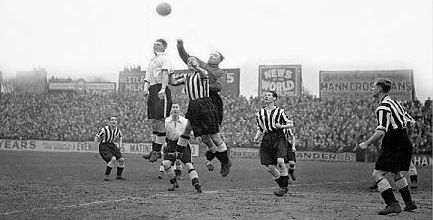
(Fulham v Newcastle. Ancell is on the extreme right watching the ball being punched away by his goallie, Tom Swinburne)
Ancell made 102 appearances for Newcastle scoring one goal, the only league goal of his senior career. Then, like his contemporaries, World War 2 put his career as a pro on hold. He did though make a further appearance for Scotland when in December 1939 he played in an unofficial match for Scotland against England at a ground with which he was very familiar, St James’ Park in Newcastle.
Bobby Ancell’s war service was as a PT instructor. In September 1942 he played in a game at Palmerston between The Army and a Scottish Select side. Among the other stars of the day to play were Matt Busby, Bill Shankly and Joe Fagan. Dumfries was home to the free Norwegian Army in exile. Ancell had a spell as football coach to the Norwegians. He guested for different clubs during the war and in 1944 joined Dundee.
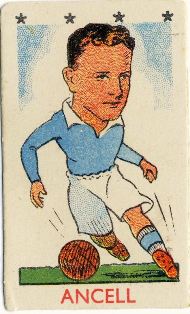
In the first full post war season, 1946/47, Ancell and Dundee were promoted to the top flight as the Second Division Champions. In that same season Ancell played in a 10-0 victory two weeks in a row. The season after Dundee finished fourth in the top tier. Also at Dundee was an ex Queen of the South goalkeeper who was to play an important role in one way and another in Ancell’s career, Reuben Bennett.
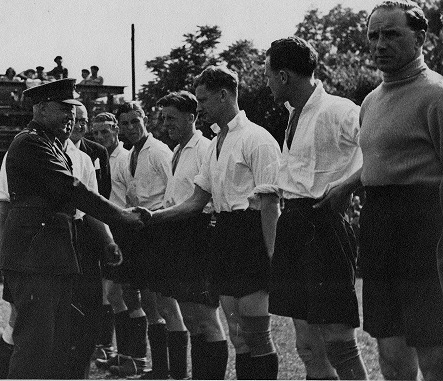
(1946. Dundee tour in Europe playing 6 games against forces teams. Ancell is the player shaking hands with the officer. Reuben Bennett is the keeper).
In 1948/49 Ancell was signed part way through the season by another Doonhamer, Dave Halliday, ex Queen of the South and ex Dundee among other clubs, and by now manager of Aberdeen. In his time at the Dons Ancell chalked up 15 league appearances. He returned to Dens the season after in which he played half a dozen league games. In total he played 64 league games for Dundee.
Ancell had been approached by Dunfermline to become their manager when he was playing for Aberdeen. Press reports of board room disputes were enough to dissuade the thoughtful Ancell. After his final playing spell with Dundee, Ancell became player / manager of Berwick Rangers in 1950.
When Ancell joined, Berwick were a side in the East of Scotland League. That changed though when they were admitted to the `C` Division of the Scottish League at the end of Ancell’s first season there. He thus became the first manager of Berwick Rangers as a senior club.
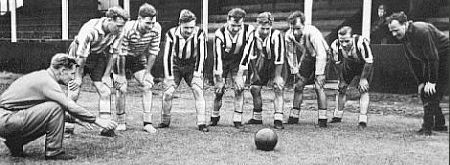
(Ancell is on the left in this picture with some of his Dunfermline players)
Dunfermline had a completely different board of directors when in 1952 the Pars approached Ancell for a second time. This time Ancell took the job. He had to assemble a squad pretty much from scratch – 18 players had been released at the end of the previous season. Squad building under budget challenges was to become something of a trademark for Ancell. Specialising in bringing in and developing younger players he moulded teams to play football exactly how he felt it should be played, skilfully and attractively. His best known signing at the Pars was Jimmy Millar who next moved to Rangers achieving great goal scoring and trophy winning success. Ancell also signed Charlie Dickson who went on to score 215 Dunfermline goals over nine seasons, but a player remembered somewhat differently by Queen’s Bobby Black.
Dunfermline improved year on year in each of Ancell’s three seasons there. His parting gift, like at St Mirren, was taking the club back to the top flight, on this occasion after an 18 year gap.
He joined Motherwell in 1955 to spend a decade there. Reuben Bennett joined his coaching staff. It was more of the same from Ancell, building teams by bringing through younger talent to play football fans enjoyed watching. His youthful side were labelled the ‘Ancell Babes’ and in his tenure The Steelmen produced a conveyor belt of eight full Scottish internationalists. The best known of these was striker, Ian St John. When Bennett joined Liverpool his inside knowledge of St John would certainly have been examined to the full leading up to manager, Bill Shankly, signing the goal grabber at Anfield. Another of the `Well internationalists was Willie Hunter, future QoS manager.
.jpg)
In Ancell’s decade at Fir Park his best league finish was third in 1959 followed with two fifth placings in the next two seasons. In 1959/60 Rangers reached the semi finals of the European Cup and won the Scottish Cup They played Motherwell four times that season and Ancell`s men won all four. The season after Rangers failed to retain the Scottish Cup. They played Ancell`s team in front of 90 000 watching Ibrox fans most of whom left stunned on the end of a 5-2 defeat.
In 1962/63 Ancell shelled out £5,000 to sign prolific striker, Joe McBride, from Partick Thistle. Such was Ancell`s committment to his club`s youth policy, this was his first delve into the transfer market for six years.
1965 brought the second Summer Cup with `Well playing in the home and away final. Dundee Utd were beaten 3-2 at home before a 0-0 2nd leg took the trophy to Fir Park. With his best players always attracting attention from elsewhere and with a never ending financial pressure at a club of limited resources, Ancell was never able to retain his top talent on the pitch. This was McBride`s last game before he joined Jock Stein`s Celtic. Deciding to move elsewhere, it was also Ancell`s last game in charge at Motherwell.
Rejoining Dundee, Ancell would have been under no illusions that there would be significant, even unrealistic expectation upon him there. His predecessor was the most successful manager in the history of Dundee F.C, Bob Shankly, brother of Bill. Shankly’s achievements at Dens Park stand head and shoulders above his counterparts. Shankly was able to retain his star men long enough to assemble a side to be 1962 Scottish Champions. Right back, Alex Hamilton, played for no other club and gathered 24 Scotland caps. Bobby Seith added the Scottish title to the one he had gathered in England with Burnley. Ian Ure represented Scotland when at Dundee and his next club, Arsenal. Gordon Smith’s signing in the Summer of his 37th birthday was a stroke of genius - he had won league titles with both Hibs and Hearts with his success at Dundee making him the only player to win the Scottish title with three different clubs. Alan Gilzean post Dens Park won domestic and European trophies in his 10 years at Spurs. At Dundee Gilzean scored seven in one game in the record of defeat of Queen of the South when George Farm was taken off early in the game. In the era before substitutes and against a non specialist keeper Dundee ruthlessly cracked in 10 goals for only two in return. The Dundee captain was Bobby Cox whose esteem at Dens Park is recognised by a stand being named after him, as is the case with Bob Shankly. As well as League Champions, Shankly took the Dens Parkers to a European Cup semi final (knocked out by A.C. Milan) and a Scottish Cup Final.
The ’62 side had broken up with Gilzean, Ure, Seith and Smith among those whose services Ancell was unable to call upon. None the less Ancell’s best league finish at Dundee was a still very creditable sixth in 1965 and `67. In his last season as a manager, 1967/68, he signed off in some style. He took Dundee to a League Cup Final where his team hit three goals against Celtic, respectable for any Scottish side playing the old firm, never mind against them in Glasgow. Celtic as the opponents doesn’t tell the whole tale though. Five months before the Parkhead side had won the European Cup Final 2-1 playing magnificent, flowing, passing football against Inter. They had swept the board domestically in Scotland. To round the 66/67 season off they beat Real Madrid at the Bernabeu in the Alfredo di Stefano testimonial with Jimmy Johnstone running riot and Bobby Lennox scoring the goal. Ancell’s men may have been boosted when they discovered Johnstone would not play against them in the Hampden final. False hope. Against Dundee’s three the European Champions hit five.
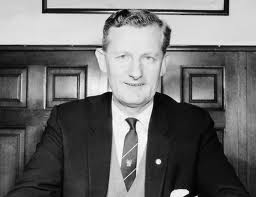
Ancell managed Dundee in a venture in the 1967/68 Fairs Cup, predecessor to the UEFA Cup and Europa League. Dutch side DWS are no longer involved in top flight football but at the time had Jan Jongbloed and Rob Rensenbrink on their books; both later played in the World Cup Final in ’74 and ’78 with Rensenbrink scoring in the ’78 group stages against Ally MacLeod’s Scotland. Against DWS Ancell’s side went through with a 3-0 home win over turning the 2-1 first leg defeat in Amsterdam.
Second round opponents were RFC Liege who despite having a decent pedigree are probably best known for the events that led to the word ‘Bosman’ being introduced into the football dictionary. Against Ancell’s side they lost home and away and went out 7-2 over the two legs. In the next round Dundee received a bye while in the quarters they beat F.C. Zurich 1-0 home and away.
Their opponents in the semi final were to be Leeds United who for the third round in a row in the competition that season played Scottish opponents. Hibs had been beaten by a late Jackie Charlton goal in the third round (2-1 agg). Rangers were eliminated in the fourth round with Johnny Giles and Peter Lorimer goals in the 2nd leg at Elland Road deciding the contest (2-0 agg).
Dundee matched Hibs by drawing 1-1 at home with Bobby Wilson equalising Paul Madeley’s effort. At Elland Road, Eddie Gray scored as he had done against Hibs. This was the only goal of the leg and Ancell’s European adventure was over. Leeds later beat Ferencváros in the final 1-0 over two legs.
.jpg)
Ancell spent a year coaching the reserves at Dens Park before winding down further his involvement in football when he restricted himself to scouting, namely for Nottingham Forest. In his retirement he continued to play sport courtesy of still enjoying his golf.
The ex internationalist retained the same belief in purist football throughout his career as player and manager. Never once as manager did any of his sides end a season in a relegation dogfight. The description of Ancell’s philosophy on football is best left to someone who scored for him in the 67/68 League Cup Final, future Dundee United manager, Jim McLean:-
“The managers I admired like Bobby Ancell always drummed it into me possession was 90 percent of what football was all about. If you won the ball you had to be sure you were keeping it. Don`t blooter it down the park and hope to create something. Keep it, believe in your technique, be patient but positive as you try to win the game.”
Bobby Ancell died on 5th July 1987.
Additional related articles:-
Ally MacLeod
Wales v Scotland - Alexander Jones
World Cup Doonhamers
Dougie McBain and the 1948 Olympics
`Sons of Scotland` - players from the Scotland squad that made it to the 2006 under 19s European Championship final to have since played for Queen of the South